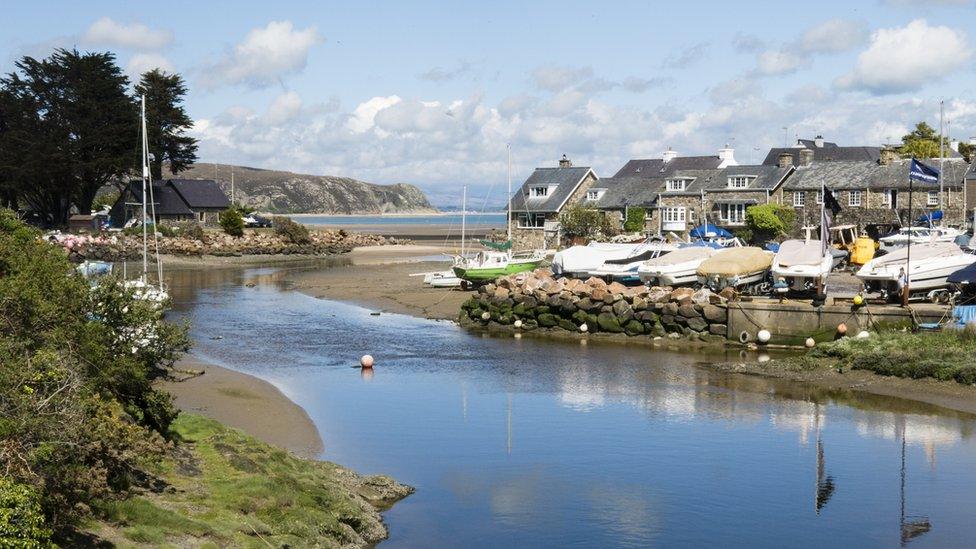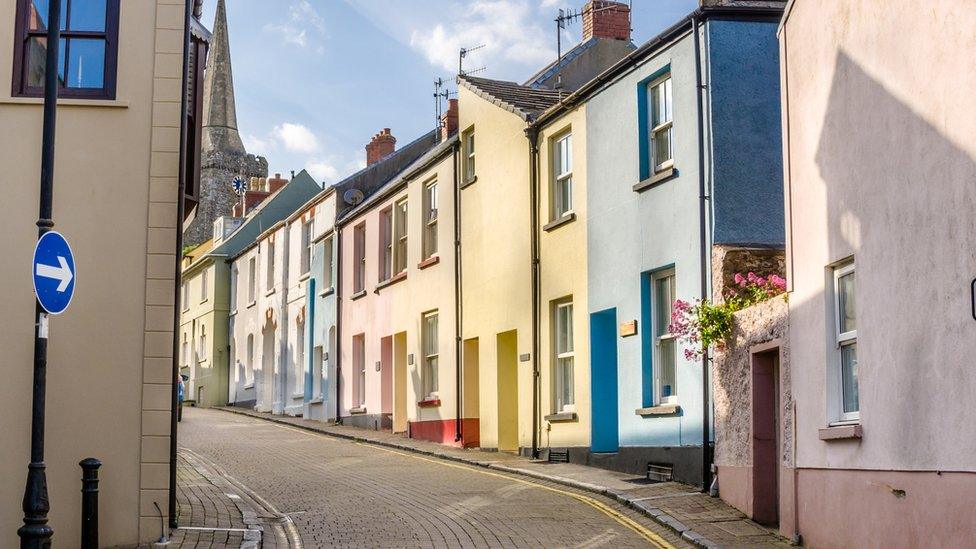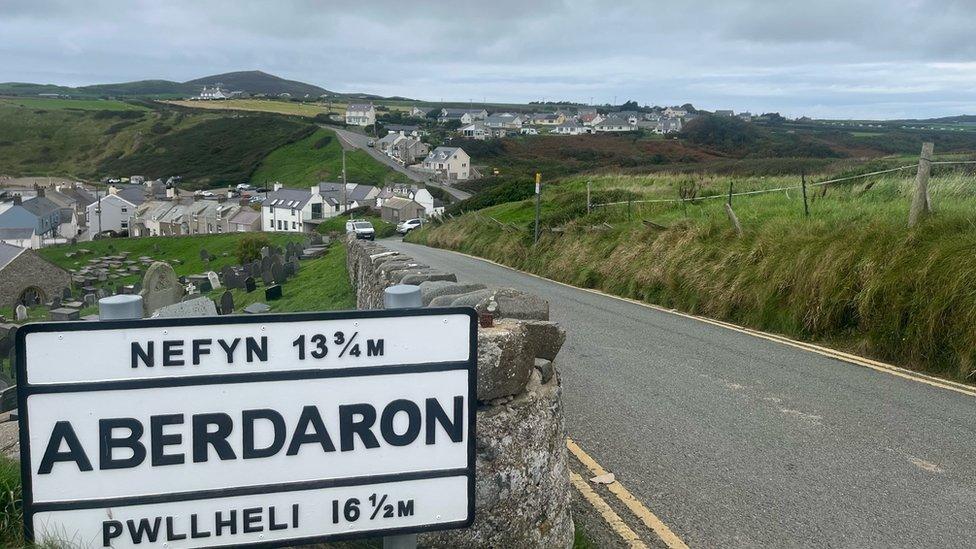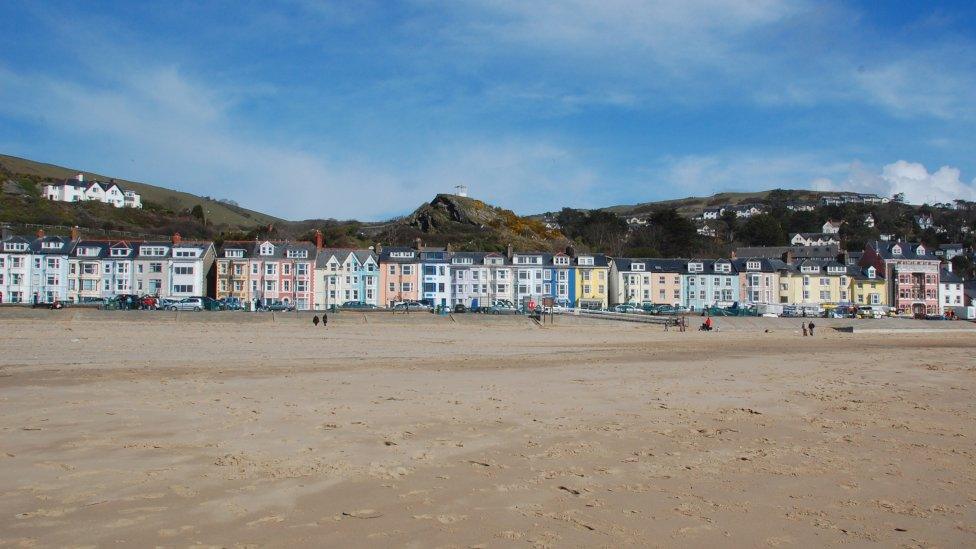Housing: Up to 120,000 Welsh homes empty, figures suggest
- Published

Abersoch sees its local population of 600 skyrocket to 30,000 in the summer
New figures have suggested that up to 120,000 houses in Wales - or one in 12 - may be sitting empty.
The majority were classed as "truly vacant", with no indication that people were living there.
About 15% (17,500) were identified as second homes.
The latest data, which has been published by the Office of National Statistics (ONS), combined Census figures from 2021 with information from other government bodies.
London was the only one of nine English regions with a higher proportion of vacant dwellings than Wales, while south west England was the only area with a marginally higher percentage of second homes.
The Welsh government said it was taking steps to ensure that "everybody has a right to a decent, affordable home to buy or to rent in their own communities".
But the ONS also warned that since the 2021 Census was conducted during the Covid pandemic, some homes that were usually occupied may have been empty when data was gathered.
With an estimated 7% of houses in Wales classed as "truly vacant", it was a higher proportion than every English region apart from London (7.3%).

There were 24,873 registered second homes in Wales at the start of 2021
Additionally, Wales had twice the proportion of second homes with no usual residents (1.2%) as England (0.6%).
Among the areas with the highest percentage of unoccupied dwellings in the whole of England and Wales is Gwynedd (19.2%), which stands at over three times the Wales average.
Other local authorities with a high proportion of empty homes include Ceredigion (15.9%), Denbighshire (15.9%), Anglesey (14.9%) and Pembrokeshire (13.9%).
Gwynedd also tops the list when it comes to the number of empty properties when the data was gathered (12,120), followed by Swansea (9,555), Pembrokeshire (8,920), Cardiff (8,690) and Denbighshire (7,980).
Vacant dwellings and second homes in Wales are also more likely to be detached houses or bungalows than in England, where flats or apartments are more commonly found.

Many local people say they are priced out of the housing market in places like Aberdaron, Gwynedd
The figures are higher, however, than previous estimates used by housing charities and the Welsh government, which earlier this year referred to figures indicating that there were "more than 22,000 long-term empty properties in Wales".
Earlier this year, the Welsh government launched a £50m National Empty Homes Grant scheme, external, offering up to £25,000 for improvements to empty homes that could then be made available again.
A spokesperson also pointed to other government initiatives on housing, including Leasing Scheme Wales and increased powers for local authorities to raise council tax premiums on second homes.
"We believe that everybody has a right to a decent, affordable home to buy or to rent in their own communities so they can live and work locally," they said.
"Long-term empty properties are a wasted housing resource and can become a blight on our communities, which is why we provide a range of measures and funding packages to reduce the number of long-term empty homes in Wales."
The National Empty Homes Grant scheme is currently operated on the government's behalf by Rhondda Cynon Taf council, which has brought 922 empty homes back into use through this and other schemes since 2017.

Gwynedd has the highest number of second homes in Wales
"We are committed to reducing the number of empty homes in Rhondda Cynon Taf, as they are a financial expense and a wasted resource that could provide much-needed affordable housing," said a spokesperson.
"Their appearance can be unsightly, and they attract anti-social behaviour."
Gwynedd council said it too had several schemes to tackle housing issues in the county, including a 150% council tax premium on second homes, and buying houses which are then let to local people "at an affordable rent".
"The housing action plan includes a first-time buyers grants scheme to renovate empty houses, which has recently been modified to include houses that used to be second homes," a spokesperson said.
"To date, 116 individuals from Gwynedd have brought 50 empty properties back into use thanks to the help of the grant scheme."
Housing charities have also emphasised the need to "make full use of every home in Wales".
"With people across Wales facing increasing levels of homelessness and housing instability, and an ever growing need for secure, decent and genuinely affordable homes, the number of empty properties in Wales is concerning," said Ruth Power, chief executive of Shelter Cymru.
"Along with building more social homes, empty properties in Wales could play an important role in providing the homes people desperately need, as well as improving communities and local environments across Wales."
- Published23 November 2021

- Published13 September 2023
